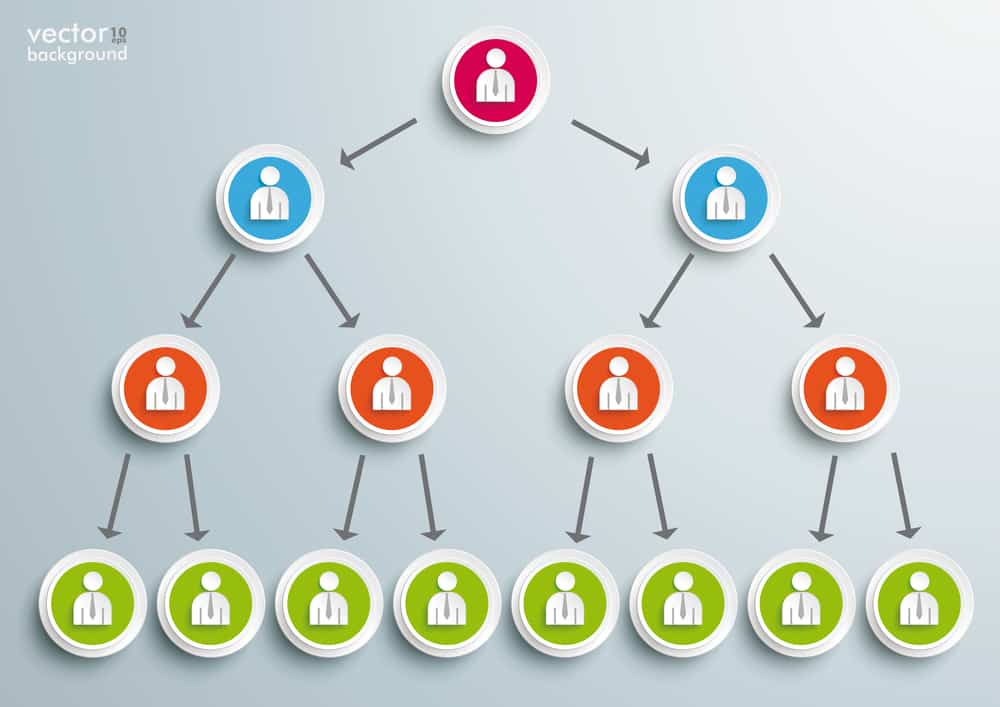The many forms and sizes of pyramid schemes often make them difficult to recognize initially. However, they all share one dominant characteristic: the promise of large profits to investors on recruiting others. Sometimes a product is used to disguise the pyramid scheme.
Ponzi schemes are closely related to pyramid schemes. However, they don’t offer profits but are based on collecting payments from people, promising a high rate of return on their investment over a short-term period. Typically, they take money from new investors to pay off older ones.
Both schemes manage to seduce people initially. However, they are illegal because they inevitably fall apart, with the investors or consumers at the bottom levels losing the most.
Some of the most famous alleged pyramid schemes in U.S. history
1. Koscot Interplanetary
Koscot Interplanetary was a company from Orlando, Florida, selling mink oil-based cosmetics and was started by Glenn W. Turner in 1967. Unfortunately, the multi-level cosmetic company became entangled in numerous legal difficulties and went out of business in the 1970s. Turner later moved on to operate another motivational company, Challenge Inc., only to be sentenced to seven years in prison in 1987 for using a pyramid scheme for fraud and conspiracy.
2. Holiday Magic
Another multi-level marketing company from the 1960s is Holiday Magic. Founded by William Penn Patrick, the company initially distributed home-care products and cosmetics. However, the company was forced to close in 1974 after it was found guilty of fraud, and it was mandated to compensate the people it defrauded by tricking them into joining the company.

3. Metabolife
Metabolife International was a multi-level marketing company based in San Diego, California, manufacturing dietary supplements. Despite the hundreds of millions of dollars earned from one of its products, the company eventually went bankrupt in 2005 and was forced to close.
4. United Sciences of America
United Sciences of America was an American company with a diversified portfolio that sold supplements through multi-level marketing. Developed by Robert Adler, a Dallas businessman, the company promoted these supplements as protection against cancer and the newly discovered AIDS.
They even had celebrity endorsements for their supplements, including Master Formula, Calorie Control Formula, and a Fiber Energy Bar. Unfortunately, sketchy advertising, fraudulent claims, excessive research grants, and enormous consulting fees led to the company’s collapse in 1987, when high-profile members distanced themselves from it.
5. Equinox International
Founded in 1991, Equinox International was another multi-level marketing company. Headed by Bill Gould, the now-defunct company had a turnover of $ 195 million in 1996. Before pouncing in, the FTC watched them for ten months to gather sufficient evidence to prove it was another pyramid marketing scam. Equinox International settled a court case with a penalty of $40 million in 2000.
6. BurnLounge
BurnLounge was an online music store founded in 2004 that relied on multi-level marketing. By 2006, Burn Lounge was declared a pyramid scheme by the Federal Trade Commission, FTC, and forced it to return $ 1.9 million to its customers.
7. Fortune Hi-Tech Marketing
Consumer goods and services were again the focus of another multi-level company called Fortune Hi-Tech Marketing. Based in Lexington, Kentucky, the company was founded in January 2001 and shut down 12 years later by the Federal Trade Commission.
8. WakeUpNow
Another famous pyramid scheme in the U.S. was the WakeUpNow multi-level marketing scheme. Based in Provo, Utah, the company was founded in 2009 by Troy Muhlestein. WakeUpNow sold various products and services based on health and financial management. After 160 complaints made to the FTC, it was found the products sold were available cheaper or for free elsewhere, and the company was closed in 2015.
9. MonaVie
MonaVie was founded in 2005 to make and distribute health products from blended fruit concentrates. Several controversies surrounded the company, including health claims for its products that lacked scientific backing or approval from regulatory authorities. It wasn’t the first time its chairman, Dallin Larsen, was involved with false health claims concerning a beverage. Unable to pay its debts of $182 million, the company was forced to close permanently.
10. Solavei
Solavei was a social commerce network for users and a contract-free mobile service in the United States. Known for its incentivized referral plans, the company also used social network advertising programs. Customers were paid for referrals. Founded by Ryan Wuerch in 2012, Solvei went bankrupt in 2015.
11. TelexFree
TelexFree, a multi-level marketing firm founded in 2012, sells VoIP telephone services. Targeting primarily Spanish-speaking immigrants living in the U.S., it promised high returns on investments made by customers who agreed to post online ads and recruit new members for the company. In 2014, TelexFree was found guilty of running a pyramid scheme, and its assets were frozen, resulting in its closure.
12. Airborne Health
Airborne Health was an American dietary supplement manufacturer based in Solana Beach, California, founded by Victoria Knight-McDowell in 1993. Using multi-level marketing, the company sold products claiming to help prevent colds and flu through vitamins, minerals, herbs, and other natural ingredients. However, the FTC sued the company for making false health claims and was forced to close in 2007 following a $23.5 million settlement.
13. ViSalus
ViSalus is a multi-level marketing company founded in 2005 that sells health and wellness products such as weight loss shakes, energy drinks, supplements, and other related items. It has been accused of being an illegal pyramid scheme due to its dubious methods of recruiting new members and encouraging them to purchase products they neither need nor use. In 2017, ViSalus was investigated by the FTC for using deceptive income claims about its potential sales opportunities.
14. Herbalife
Herbalife is one of the most well-known American multi-level marketing companies. The company was founded in 1980 and sells health and nutrition products via independent distributors. Over the years, Herbalife has been accused of being an illegal pyramid scheme due to its emphasis on recruiting members rather than selling products and questionable sales techniques. In 2019, Herbalife was ordered by the FTC to pay $200 million for deceiving customers and misleading them about how much money they could make by becoming distributors.

15. Nuskin
Nuskin is a multi-level marketing company that sells health and beauty products through independent distributors. The company has been in operation since 1984 and has faced numerous accusations of operating an illegal pyramid scheme due to its focus on recruitment rather than sales of products and the high prices it charges for some products. In 2017, the FTC charged Nuskin with deceptive advertising practices related to their anti-aging facial creams.
16. Amway
Amway is one of the largest multi-level marketing companies in the world, founded in 1959 in Ada, Michigan, by Rich DeVos and Jay Van Andel. Amway sells consumer goods, such as home care products, personal care items, and dietary supplements. In 2010, Amway was fined $150 million by the FTC for misleading customers about their income potential as independent distributors.
17. Digital Altitude
Digital Altitude is a multi-level marketing company based in California that offers digital marketing training courses. The company has been accused of being an illegal pyramid scheme because it focuses on recruitment rather than product sales, expensive membership fees, and deceptive advertising practices. In 2017, the FTC charged Digital Altitude with deceptive business practices related to its high-priced coaching program.
18. AdvoCare
AdvoCare is a multi-level marketing firm founded in 1993 that sells health and wellness products such as energy drinks, vitamins, weight loss supplements, and other related items. It has been accused of being an illegal pyramid scheme due to its high-pressure recruitment tactics and exaggerated promises about the potential earnings from selling its products. In 2019, AdvoCare agreed to pay restitution of $149 million for operating an illegal pyramid scheme.



